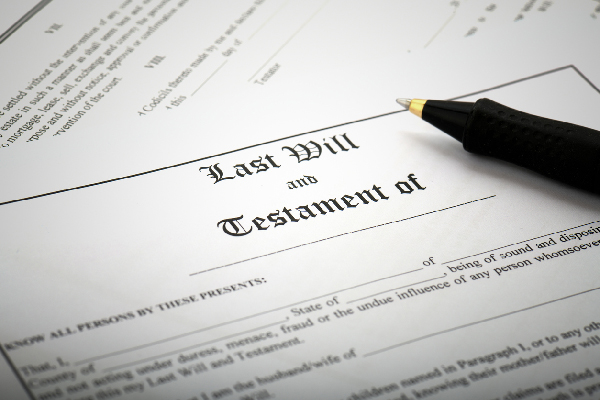
Additional FAQs About Wills - Your Guide to Estate Planning
By creating an estate plan, you can help to ensure that your wishes are followed regarding the distribution of your assets once you are gone. However, people just starting the process of creating an estate plan may experience confusion with the process. There are many misconceptions about how wills and other estate planning documents work.
We have previously looked at what a last will and testament is. However, you are not alone if you still have questions about how this document works and how you will know if you should include a will in your estate plan. Need help to better understand your estate planning options? Read on for a look at additional frequently asked questions we receive about wills.
Do You Need a Minimum Amount of Assets to Create a Will?
One of the biggest misconceptions about wills, and about estate planning in general, is that creating one isn't necessary if you aren't rich. You might think that you need a minimum amount of assets in order to create a will.
However, this is as far from the truth as possible. The fact is that anyone over the age of 18 can create a will regardless of the worth of their estate. No estate is too small for estate planning. An estate plan can make things easier for your loved ones following your death no matter how many assets you have.
In fact, a will is often the preferred estate planning method for people with small, uncomplicated estates who don't own property. This is because wills are simpler to set up and alter than a trust. In these cases, a will provides a simple and affordable way to ensure that your family follows your wishes once you are gone.
What is the Difference Between a Last Will and Testament and a Living Will?
Oftentimes when discussing estate planning, people will use the terms "will" and "living will" interchangeably; however, these are actually two separate and distinct documents that are both essential components of a comprehensive estate plan.
A last will and testament, often simply referred to as a will, provides directions on how you want your estate divided upon your death. Meanwhile, a living will is a legal document that provides directions on how you want decisions to be made regarding your health while you are still alive. Should you become incapacitated and medical decisions need to be made on your behalf, a living will can provide your family and medical professionals with instructions on how you want to be cared for.
For instance, people will often use a living will to designate whether or not they want to be resuscitated or put on life support should they fall critically ill. Some states also call a living will an Advanced Health Care Directive.

Can Someone Challenge My Will After My Death?
Incorporating a will into your estate plan can be a great way to provide your family with guidance on how you want your assets handled following your death. As long as the will is valid, most families and probate courts will respect the wishes of the testator (the person who created the will) as outlined in the will. However, wills are not foolproof, and they can be challenged by disgruntled relatives under certain circumstances.
In rare cases, a relative of a deceased individual may try to contest a will in court. This is due to the fact that they feel cheated out of a portion of the testator's estate that they feel entitled to. Fortunately, challenging a will is not a simple matter. An individual must prove that the will was either forged, created under coercion, or that the testator was not of sound mind when the will was created. This is why it is critical that you are careful when drafting your will to help prevent legal challenges. Working with an experienced estate planning attorney can help ensure that your will holds up against potential challenges in court.
Can a Will Help My Estate Avoid Probate?
Another common misconception about wills is that they will help an estate to avoid probate court. In reality, a last will and testament provides guidance on how to divide your estate. However, your estate must still pass through probate court so that a judge can validate your will and oversee the dispersal of your assets.
Unfortunately, this often comes as a surprise to families who believed that they would be able to avoid the hassle and expense of probate court if their loved one had a will. Ultimately, a desire to avoid probate is often the deciding factor that leads people to choose a trust instead of a will when creating their estate plan. You can transfer assets transferred to a trust to beneficiaries without the need for probate court. This allows for a simpler, faster, and more private dispersal of assets following a loved one's death. If helping your family avoid probate is your primary concern when creating an estate plan, consider working with an estate planning attorney to learn about which options may work best for you.
Do I Need to Have a Lawyer to Create a Will?
One of the most common questions people ask about wills is whether it is required that they work with a lawyer when drafting their will. The answer to this question is no; no state law requires you to get the assistance of a lawyer when creating a will. However, if you plan on creating your own will, it is imperative that you spend some time researching estate planning laws in your state in order to ensure that you fill everything out properly and have the required witnesses and signatures.
You may not need to work with an attorney when estate planning. However, we highly recommended that you do so. Even something as seemingly simple as creating a will can prove to be a complicated process. Working with an experienced estate planning attorney will ensure everything is done correctly. The last thing you want to happen is to spend time creating a will only for your family to discover after your death that it is invalid.
Work with an Expert to Help You with Estate Planning
Estate planning can often feel like an overwhelming and confusing process. This is why it is a good idea to consider working with an attorney as you create your estate plan. Feel free to contact us to learn more about wills, trusts, and the steps you should take when estate planning.
For more information please request a copy of our Legal Services Schedule (PDF format).
![]()